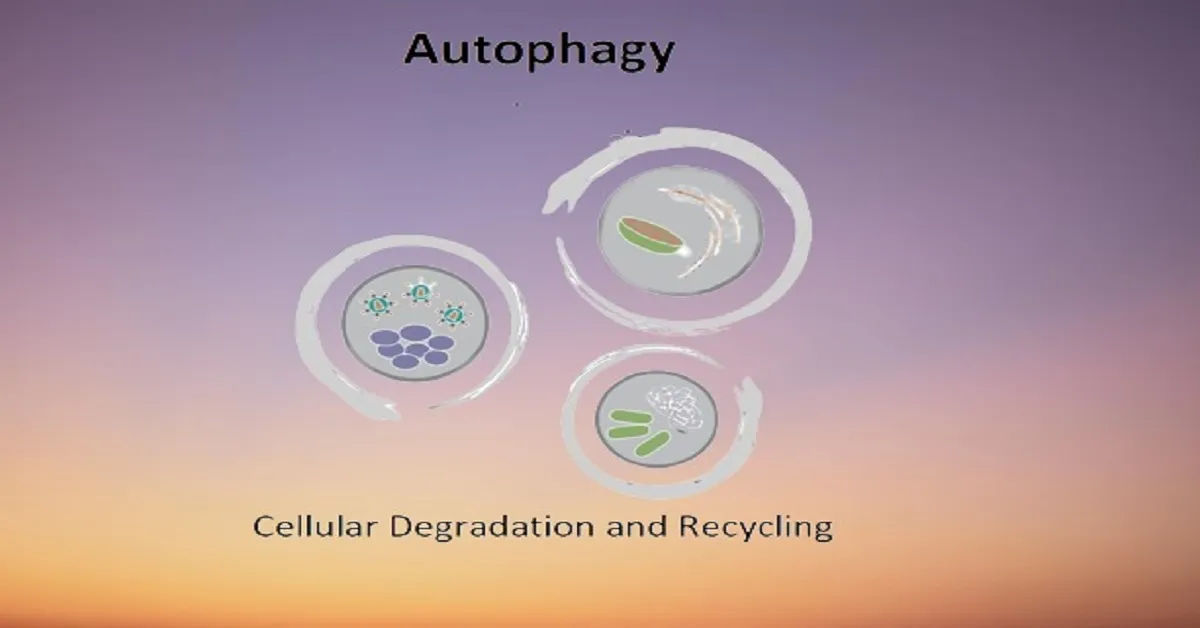Outline of the Article:
- Introduction to Autophagy
- Understanding the Process of Autophagy
- Definition of Autophagy
- How Autophagy Works
- Types of Autophagy
- Significance of Autophagy in Cellular Regeneration
- Autophagy and Disease Prevention
- Role of Autophagy in Maintaining Cellular Health
- Autophagy and Aging
- Autophagy and Neurodegenerative Diseases
- Autophagy and Cancer
- Inducing Autophagy
- Dietary Factors that Promote Autophagy
- Exercise and Autophagy
- Intermittent Fasting and Autophagy
- Benefits of Autophagy for Overall Health
- Cellular Detoxification
- Improved Immune Function
- Enhanced Cellular Repair
- Anti-Inflammatory Effects
- Metabolic Health and Weight Management
- Methods to Boost Autophagy
- Caloric Restriction
- Ketogenic Diet
- Herbal Supplements
- Lifestyle Modifications
- Potential Risks and Limitations of Autophagy
- Excessive Autophagy
- Genetic Factors
- Implications for Certain Health Conditions
- Conclusion
- FAQs
- How long does it take for autophagy to occur?
- Can autophagy reverse aging?
- Is autophagy only beneficial for physical health?
- Can autophagy be harmful to the body?
- Can autophagy help in weight loss?
What is Autophagy? A Journey into Cellular Regeneration and Disease Prevention
Autophagy, derived from the Greek words “auto” meaning self and “phagy” meaning eating, is an essential cellular process that plays a vital role in maintaining the overall health and well-being of an organism. It involves the recycling and degradation of damaged or unnecessary cellular components, such as proteins, organelles, and even pathogens, to generate energy and build new molecules. This self-cleaning mechanism allows cells to adapt to changing conditions, repair damage, and prevent the accumulation of toxic substances.
Understanding the Process of Autophagy
Definition of Autophagy
Autophagy can be defined as a highly regulated process by which cells break down and recycle their own components to maintain cellular homeostasis. It is a complex process involving the formation of double-membraned structures called autophagosomes, which engulf cytoplasmic cargo destined for degradation. These autophagosomes then fuse with lysosomes, forming autolysosomes, where the cargo is broken down by enzymes and recycled.
How Autophagy Works
Autophagy is initiated in response to various internal and external cues, such as nutrient deprivation, oxidative stress, or infection. The process involves several stages, including initiation, elongation, maturation, fusion, and degradation. Key regulators of autophagy include the mammalian target of rapamycin (mTOR) pathway and various autophagy-related genes (ATGs).
Types of Autophagy
There are three main types of autophagy: macroautophagy, microautophagy, and chaperone-mediated autophagy. Macroautophagy is the most extensively studied form and involves the formation of autophagosomes to sequester cellular components. Microautophagy, on the other hand, involves the direct engulfment of cytoplasmic material by lysosomes. Chaperone-mediated autophagy targets specific proteins for degradation.
Significance of Autophagy in Cellular Regeneration
Autophagy plays a crucial role in cellular regeneration by ensuring the removal of damaged or dysfunctional components and promoting the recycling of cellular materials. It helps maintain protein and organelle quality control, cellular metabolism, and overall cellular fitness. Proper autophagic activity is essential for cell survival, development, and differentiation.
Autophagy and Disease Prevention
Role of Autophagy in Maintaining Cellular Health
Autophagy serves as a critical cellular defense mechanism against various diseases. It helps remove misfolded proteins, damaged organelles, and intracellular pathogens, thus preventing the accumulation of toxic aggregates and reducing cellular stress. By eliminating these harmful components, autophagy helps maintain the integrity and functionality of cells.
Autophagy and Aging
Autophagy has been closely linked to the aging process. As we age, the efficiency of autophagy declines, leading to the accumulation of damaged cellular components and increased susceptibility to age-related diseases. By enhancing autophagy, it is possible to promote healthy aging and potentially extend lifespan.
Autophagy and Neurodegenerative Diseases
Impaired autophagy has been implicated in the pathogenesis of neurodegenerative diseases such as Alzheimer’s, Parkinson’s, and Huntington’s disease. The accumulation of toxic protein aggregates in these conditions can overwhelm the autophagy machinery, leading to neuronal dysfunction and cell death. Enhancing autophagy may hold promise as a therapeutic strategy for these diseases.
Autophagy and Cancer
Autophagy has a complex role in cancer. While it can suppress tumor initiation by eliminating damaged DNA and preventing the accumulation of oncogenic proteins, autophagy can also support tumor growth by providing nutrients and protecting cancer cells from stress-induced cell death. The precise role of autophagy in cancer is context-dependent and requires further research.
Inducing Autophagy
Dietary Factors that Promote Autophagy
Certain dietary factors have been shown to promote autophagy. Caloric restriction, intermittent fasting, and low-carbohydrate diets can stimulate autophagy by reducing nutrient availability. Additionally, specific compounds such as resveratrol, curcumin, and green tea catechins have been found to activate autophagy pathways.
Exercise and Autophagy
Regular exercise has been shown to enhance autophagy. Endurance training, resistance training, and high-intensity interval training can all induce autophagy in different tissues. Exercise-induced autophagy helps maintain cellular health, promote mitochondrial biogenesis, and improve overall metabolic function.
Intermittent Fasting and Autophagy
Intermittent fasting, a dietary approach that involves cycles of fasting and eating, has gained significant attention for its potential health benefits, including autophagy induction. By extending the fasting period between meals, intermittent fasting triggers autophagy as a response to the reduced nutrient availability, promoting cellular rejuvenation.
Benefits of Autophagy for Overall Health
Autophagy offers several benefits for overall health and well-being.
Cellular Detoxification
Autophagy helps eliminate toxic substances and damaged components from cells, thereby reducing cellular stress and promoting detoxification. By regularly clearing out unwanted material, autophagy enhances cellular function and longevity.
Improved Immune Function
Autophagy plays a crucial role in immune cell function and defense against infections. It helps remove intracellular pathogens, facilitates antigen presentation, and enhances the efficiency of immune responses. Proper autophagy ensures a robust and effective immune system.
Enhanced Cellular Repair
Autophagy promotes cellular repair mechanisms by degrading damaged proteins and organelles. It helps maintain protein and organelle quality control, supporting the regeneration and renewal of cells. This process is particularly important for tissues with high cell turnover rates, such as the skin and the lining of the gut.
Anti-Inflammatory Effects
Autophagy can help regulate inflammation by removing inflammasomes and damaged cellular components that can trigger inflammatory responses. By reducing chronic inflammation, autophagy contributes to overall health and protects against various inflammatory diseases.
Metabolic Health and Weight Management
Autophagy has implications for metabolic health and weight management. By recycling cellular components, autophagy contributes to energy balance and nutrient utilization. Dysfunction in autophagy has been linked to metabolic disorders such as obesity, insulin resistance, and fatty liver disease.
Methods to Boost Autophagy
Caloric Restriction
Caloric restriction, or reducing calorie intake without malnutrition, has been shown to enhance autophagy. By limiting the availability of nutrients, caloric restriction activates autophagy as a survival response. However, it is essential to approach caloric restriction with caution and under professional guidance to ensure adequate nutrition.
Ketogenic Diet
The ketogenic diet, characterized by high fat, low carbohydrate, and moderate protein intake, has gained popularity for various health benefits. It has been found to promote autophagy, primarily due to the limited availability of glucose, forcing the body to rely on ketones for energy. The ketogenic diet should be followed with proper guidance and monitoring.
Herbal Supplements
Certain herbal supplements have been associated with autophagy induction. For example, compounds like resveratrol (found in red wine), curcumin (found in turmeric), and green tea catechins have demonstrated autophagy-enhancing properties. However, more research is needed to establish the efficacy and safety of these supplements.
Lifestyle Modifications
In addition to dietary interventions, certain lifestyle modifications can support autophagy. Regular exercise, adequate sleep, stress management, and maintaining a healthy body weight can all contribute to optimal autophagy. These lifestyle factors promote overall health and well-being.
Potential Risks and Limitations of Autophagy
Excessive Autophagy
While autophagy is generally beneficial, excessive autophagy can have detrimental effects. Uncontrolled or prolonged autophagy can lead to excessive degradation of essential cellular components and contribute to cellular damage. Maintaining a balanced and regulated autophagy process is crucial for optimal cellular function.
Genetic Factors
Genetic factors can influence autophagy efficiency and susceptibility to autophagy-related diseases. Certain genetic variants in autophagy-related genes can impair or enhance autophagy function. Understanding individual genetic predispositions can help identify personalized approaches to modulating autophagy.
Implications for Certain Health Conditions
Although autophagy is generally beneficial, its role in certain health conditions is complex. For example, autophagy can have opposing effects in cancer, as it can both promote tumor suppression and support tumor growth. It is essential to consider the specific context and consult with healthcare professionals regarding autophagy modulation in specific disease states.
Conclusion
Autophagy is a fascinating cellular process with significant implications for health and disease prevention. By promoting cellular regeneration, removing damaged components, and maintaining overall cellular health, autophagy plays a vital role in maintaining the balance and functionality of our bodies. Understanding the factors that regulate autophagy and adopting lifestyle interventions that enhance autophagy can contribute to optimal health and well-being. To learn more about the amazing advantages of Autophagy, simply follow this link Benefits of Autophagy
FAQs
1. How long does it take for autophagy to occur?
The duration of autophagy induction varies depending on the specific stimulus and the cellular context. In general, autophagy can be initiated within a few hours of nutrient deprivation or other triggers.
2. Can autophagy reverse aging?
While autophagy is involved in various processes associated with aging, including cellular repair and detoxification, it is not a direct reversal of aging itself. However, by promoting cellular health and mitigating age-related damage, autophagy can contribute to healthy aging.
3. Is autophagy only beneficial for physical health?
No, autophagy is not limited to physical health benefits alone. It also has implications for mental health and cognitive function. Autophagy helps remove toxic protein aggregates in the brain and supports neuronal health, which can have positive effects on cognitive function and overall mental well-being.
4. Can autophagy be harmful to the body?
Excessive or uncontrolled autophagy can be harmful to the body by degrading essential cellular components. It is important to maintain a balanced autophagy process to avoid excessive damage and dysfunction.
5. Can autophagy help in weight loss?
Autophagy can indirectly contribute to weight loss by promoting metabolic health and improving overall cellular function. However, weight loss should be approached holistically, considering various factors such as diet, exercise, and overall lifestyle choices. Autophagy alone is not a sole determinant of weight loss.




